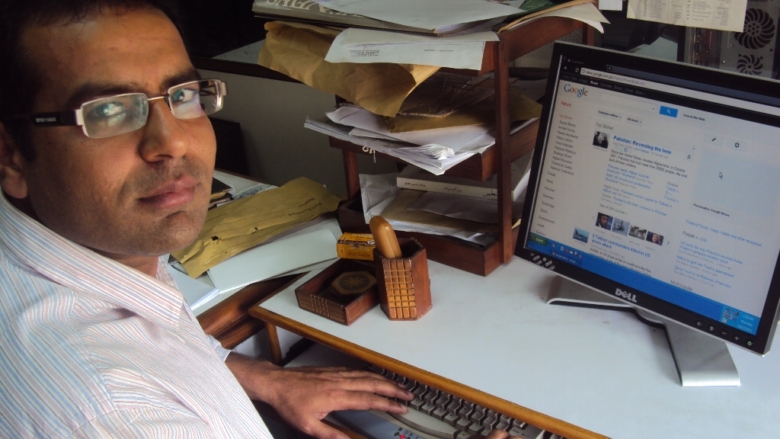Spotlight on Waqar Gillani, of Pakistan

Questions & Answers with Waqar Gillani
Waqar writes about religion as a staff member of The News on Sunday, which is the weekly edition of The News International. It is one of Pakistan’s largest English-language daily newspapers, with a London edition.
Waqar has contributed to reports for The New York Times, Agence France-Presse and United Press International. He works also in Urdu, the main language of Pakistan.
Q.
Tell us about where you live.
A.
A. I’m based in Lahore, Pakistan. The country has an estimated population of 180 million people.
The city is known as the cultural capital of Pakistan.
It’s famous because of its food, art and lively people. It’s also known for its architecture from both the Mughal and British eras.
Q.
What are the main religions of your region?
A.
Sunni Islam is by far the largest. There is also a significant minority of Christians, as well some Sikhs, Hindus and Parsis (or Zoroastrians).
Q.
What are key issues affecting Pakistan when it comes to religion?
A.
Religious intolerance and religious-based violence. For many reasons there is an absence of a counter narrative to these destructive forces.
Q.
What are some religion stories you have done of which you’re proud?
A.
There are several stories I have done about religious extremism and violence. I have covered controversial Islamic laws that are sometimes misused by the Muslim majority against other religious minorities or even against other Muslims. Sometimes this is done to settle personal scores or grab properties. I’ve written about how many Pakistanis have been killed or fined on the pretext of Muslim blasphemy laws.
Q.
How did you end up covering religion? How long have you covered it?
A.
I have now been covering religion for more than one decade. As I reported on different beats, I have long realized that religion is the real subject underlying many issues. I think religious issues need to be highlighted more in the Pakistani and global media.
Q.
What challenges have you faced as a religion reporter?
A.
Sometimes it is difficult because of a feeling of a lack of protection, safety and security. It is easy for some people in Pakistan to label a journalist; claiming they are a Western or American agent.
In addition, some people turn every religious issue into a sectarian conflict. It is often hard to get the proper information and facts from all sides.
Working in the English-language media, or for the foreign press, can also be difficult. Many Pakistanis doubt the foreign media. And to be honest, sometimes some journalists from the foreign media exaggerate.
Q.
Why do you think religion reporting is important?
A.
It is important because the current biggest conflicts on the globe are based on religion. That is especially true in regards to Muslims versus members of other religions, particularly Christians, Jews and Hindus.
There is a need to create balance, promote neutrality and dialogue on religious issues. We must call for co-existence and search for common ground through fair reporting on religion.
Q.
How do we keep religion coverage accurate and interesting?
A.
By asking more questions about religion. By taking the views of all sides into account. By talking about commonalities among people and separating cultural aspects linked to religion. By highlighting positive developments and creating the space for debate.
Q.
How do you think new media and the spread of information today via the Internet impacts your work and the stories that you cover?
A.
The Internet gives so many tips for stories. But many times the information on the Internet is one-sided or exaggerated. The best thing to do is to take these Internet feeds but not rely on them alone. We must do proper fact finding before taking them seriously.
Q.
What do you hope to get out of being a member of the IARJ?
A.
Through IARJ, we can talk about improving the standards of religion reporting. Through different programs, discussions and forums, we can talk about the value of journalistic neutrality and balance.
Q.
How do you think we can encourage news media to place more importance on religious coverage?
A.
The IARJ should sponsor public discussions on religious issues – and offer short courses on particular points and issues related to religion reporting, making comparisons between how it is done around the world.
We can encourage more journalists to cover religious issues in a wholehearted and open-minded way — for the sake of the peace and beauty of this world.
I think we should all live and let live. I believe all prophets, religions and ideologies ultimately aim for social harmony, social justice and human rights.
I don’t want to see religions becoming autocracies and theocracies. I don’t think we should be fighting with each other or imposing our views on others.
Q.
Let’s end with some fun personal questions. What is your favorite food?
A.
Grilled fish. And pasta with cream and chicken.
Q.
Where are some of your favorite places?
A.
Miami and San Francisco in the U.S. And Oslo in Norway.
Q.
What is your favorite kind of music?
A.
Violin. And Sufi music.
Thank you very much Waqar. I’ve learned a lot.
Note: This Question and Answer profile has been condensed and edited.
Contact information
Waqar GillaniStaff Reporter
The News on Sunday
The News International [Jang Group of Publications]
13-Sir Aga Khan Road [Davis Road]
Lahore-54000, Pakistan
Twitter: @waqargillani
Email: [email protected]
